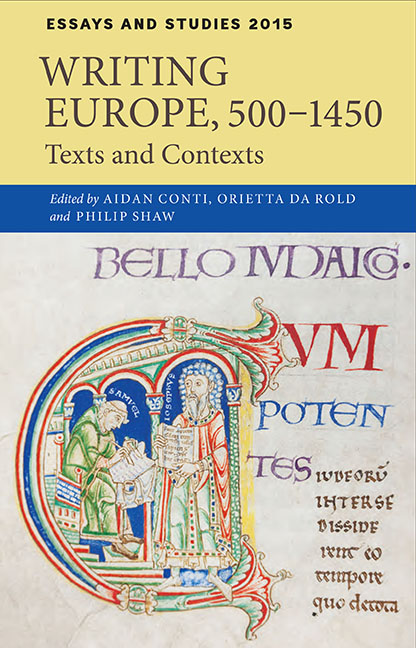Book contents
- Frontmatter
- Contents
- List of Illustrations
- Notes on Contributors
- Preface
- Acknowledgments
- List of Abbreviations
- Medieval Manuscript Studies: A European Perspective
- The DigiPal Project for European Scripts and Decorations
- Italian Giant Bibles: The Circulation and Use of the Book at the Time of the Ecclesiastical Reform in the Eleventh and Twelfth Centuries
- Isolation or Network: Arengas and Colophon Verse in Frisian Manuscripts around 1300
- Writing the Germanic Languages: The Early History of the Digraphs
, and The New Heathens: Anti-Jewish Hostility in Early English LiteratureLatin Composition in Medieval NorwayTranslating Europe in Medieval WalesCharms among the Chants: Verbal Magic in Medieval Bulgarian ManuscriptsIndexIsolation or Network: Arengas and Colophon Verse in Frisian Manuscripts around 1300
Published online by Cambridge University Press: 11 June 2021
Book contents- Frontmatter
- Contents
- List of Illustrations
- Notes on Contributors
- Preface
- Acknowledgments
- List of Abbreviations
- Medieval Manuscript Studies: A European Perspective
- The DigiPal Project for European Scripts and Decorations
- Italian Giant Bibles: The Circulation and Use of the Book at the Time of the Ecclesiastical Reform in the Eleventh and Twelfth Centuries
- Isolation or Network: Arengas and Colophon Verse in Frisian Manuscripts around 1300
- Writing the Germanic Languages: The Early History of the Digraphs , and
- The New Heathens: Anti-Jewish Hostility in Early English Literature
- Latin Composition in Medieval Norway
- Translating Europe in Medieval Wales
- Charms among the Chants: Verbal Magic in Medieval Bulgarian Manuscripts
- Index
Summary
LITERACY CAME RATHER late to Frisia, a narrow stretch of land no deeper than some 25 kilometres and running along the coast of the North Sea between the estuaries of the Rhine and the Weser. Although the Frisians had been converted to Christianity from the late seventh century to the end of the ninth, very few centres of learning, if any at all, had come about in the centuries immediately following their conversion, due to various circumstances. First of all, the missionaries who evangelised amongst the Frisians had their bases far away from the coast: Willibrord's home abbey was in Echternach (Luxembourg), Boniface worked from Fulda (Hessen), Liudger resided in Werden (Ruhr area), while also from Corvey abbey on the lower Weser anonymous monks had worked in the Frisian lands. As a result, when newly converted pious Frisians wanted to donate land in honour of God and for the benefit of their souls, they did so to these monasteries rather than seeing to it that such pious communities were founded within the confines of Frisia itself to which they could relate.
A second factor frustrating the foundation of centres of Christian literacy was the arrival of the Vikings. Shortly after Charlemagne had completed the conquest of Frisia and its incorporation into his empire, the coastal districts started to become a target for increasingly frequent Scandinavian raids. These plundering activities were only temporarily brought to a halt when Charlemagne's grandson Hlothar appointed the Dane Rorik as count of Frisia in 850. For more than twenty-five years successive Danes ruled the Low Countries not unlike a kind of Normandy or Danelaw, but eventually they failed to settle permanently and establish a duchy or county there. Only around 950 did the coast see a nunnery in the dunes of Egmond (about 30 km north-west of Amsterdam), founded at the invitation of Count Dirk I, by Benedictines of the abbey of St Bavo in Ghent and hence oriented more to the south than to the north.
A third factor thwarting the rise of literacy was the ecclesiastical administration. Frisia never received its own bishopric, but the Frisian lands subsisted under the successors of whichever missionary had been responsible for their conversion. Hence, the Frisian lands became divided between four different bishoprics: Utrecht (Willibrord), Münster (Liudger), Paderborn (successor to Corvey abbey) and Bremen (Willehad), all of them situated outside Frisia.
- Type
- Chapter
- Information
- Writing Europe, 500-1450Texts and Contexts, pp. 83 - 100Publisher: Boydell & BrewerPrint publication year: 2015
Save book to Kindle
To save this book to your Kindle, first ensure coreplatform@cambridge.org is added to your Approved Personal Document E-mail List under your Personal Document Settings on the Manage Your Content and Devices page of your Amazon account. Then enter the ‘name’ part of your Kindle email address below. Find out more about saving to your Kindle.
Note you can select to save to either the @free.kindle.com or @kindle.com variations. ‘@free.kindle.com’ emails are free but can only be saved to your device when it is connected to wi-fi. ‘@kindle.com’ emails can be delivered even when you are not connected to wi-fi, but note that service fees apply.
Find out more about the Kindle Personal Document Service.
- Isolation or Network: Arengas and Colophon Verse in Frisian Manuscripts around 1300
-
- Book: Writing Europe, 500-1450
- Online publication: 11 June 2021
×Save book to Dropbox
To save content items to your account, please confirm that you agree to abide by our usage policies. If this is the first time you use this feature, you will be asked to authorise Cambridge Core to connect with your account. Find out more about saving content to Dropbox.
- Isolation or Network: Arengas and Colophon Verse in Frisian Manuscripts around 1300
-
- Book: Writing Europe, 500-1450
- Online publication: 11 June 2021
×Save book to Google Drive
To save content items to your account, please confirm that you agree to abide by our usage policies. If this is the first time you use this feature, you will be asked to authorise Cambridge Core to connect with your account. Find out more about saving content to Google Drive.
- Isolation or Network: Arengas and Colophon Verse in Frisian Manuscripts around 1300
-
- Book: Writing Europe, 500-1450
- Online publication: 11 June 2021
×



